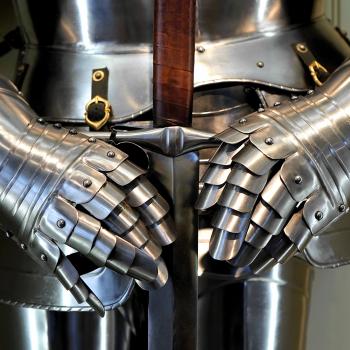To Train Up A Child, chapter 5, part 5
This week we finish chapter 5, “The Rod.” If you’ve read nothing else of this series of reviews, read this section. This section gives a great deal of insight into how Michael views the rod, and what he alternately calls “spankings” and “whippings.” We’ve noted previously that Michael continually tells parents to spank, hit, and otherwise beat their children, seemingly unaware of any other tools a parent might use to correct or guide a child. In the previous two weeks, Michael has said that children actually want to be whipped, and that the rod frees children from guilt and self loathing. This section, though, is the most explicit yet, revealing that Michael really does think that “the rod,” which he at one point calls a “magic wand,” should be parents’ first and primary parenting tool.
THE CANE, NOT THE CORNER
One young boy is not spanked when he throws a tantrum or disobeys. It seems that he delights in doing what he is commanded not to do. The more he rebels, the meaner and guiltier he gets. For punishment, he is pinched or made to sit in the corner, or sometimes put in a dark closet. When he comes out he is madder than ever. He could intimidate a fire-eating dragon.
Sitting in a corner, he was heard to say, “Nobody likes me. I’m as bad as the Devil. I never do anything right.” This little fellow is being reared to take his place in a jail cell. Dark corners and dark closets breed darkness in the soul. An empty room and a pouting child incubates guilt and anger. Only the rod and reproof bring correction. Somehow children know the rod is their just due.
Here is Michael’s logic: A child made to sit in a corner for his transgressions will feel he can never do anything right and is a failure and might as well stop trying; the solution is to whip the child for his transgressions instead of making him sit in a corner. This is absurd. Yes, sitting a child in a time out can incubate guilt and anger. But the rod can (and often does) also incubate guilt and anger. As for children knowing that “the rod is their just due,” I call bullshit. There were plenty of times when I was spanked when all I could think of was the injustice of it. And my daughter Sally, whom I am raising without any form of corporal punishment, was aghast when she recently learned that some parents hit their children as punishment. She certainly doesn’t just naturally “know” that the rod is her “just due.”
And again, Michael seems completely unaware that positive parenting techniques exist. He apparently thinks that parents who don’t spank instead pinch their children, sit them in corners, or shut them in dark closets. The only one of these that is actually a common alternative to corporal punishment is the time out, and even parents who do use time outs (and many do) rarely use them exclusively, and frequently use them very differently from Michael’s portrayal. Michael has said that the rod should never be applied in anger, and has differentiated between methodical and unemotional whipping on the one hand and emotional and out of control whipping on the other. He refuses to do that for things like time outs, however. Yes, time outs can turn into something negative and only lead to more anger and an increased lack of understanding between parent and child. But they can also be used in a much less negative way, without severing the parent-child relationship or incubating guilt or anger.
I feel like Michael would benefit from perusing the gentle discipline and positive parenting blogosphere. At least then he might stop stereotyping and strawmanning those who don’t spank.
BLESSED GUILT
Guilt is an essential part of our natural, moral self. Without it we would be like a smoke detector with no alarm. But, guilt is only a means to an end, a temporary condition. It’s the soul’s pain, as when we touch something hot, designed to give us warning, to change our actions. It is a great blessing to feel guilt, a sign of life, a healthy response. Do not follow the modem philosophy by trying to eliminate guilt through fudging on the standards. Keep the standards high—as high as the person of Christ. Let the guilt come, and then, while they are yet too young to understand, absolve it by means of the rod. When their time comes, the principles of the cross will be easy to grasp.
Whipping a child, which is the term Michael uses for applying “the rod,” does not absolve a child of guilt, especially when they are too young to understand. I went over this last week, but there are times when a child may feel guilty and may need a way to absolve that guilt. For example, if Sally hits Bobby because he was getting in her things but then feels bad about it when she sees him cry, she may feel the need to hug and comfort him to make up for what she did. In no way would me whipping her for hitting her brother absolve anything.
THE POWER OF “ABSOLUTION.”
The parent holds in his hand (in the form of a little switch) the power to absolve the child of guilt, cleanse his soul, instruct his spirit, strengthen his resolve, and give him a fresh start through a confidence that all indebtedness is paid. “The blueness of a wound cleanseth away evil: so do stripes the inward parts of the belly (Prov. 20:30).” “Inward parts of the belly” is a description of the physical sensations associated with guilt.
Stripes (“scourgeth” Heb. 12:6) are said to be to the soul what the healing blood flow is to a wound. A child properly and timely spanked is healed in the soul and restored to wholeness of spirit. A child can be turned back from the road to hell through proper spankings. “Withhold not correction from the child; for if thou beatest him with the rod, he shall not die. Thou shalt beat him with the rod, and shalt deliver his soul from hell (Prov. 23:13, 14).”
Father, as high priest of the family you can reconcile your child to newness of life. Guilt gives Satan a just calling card and a door of access to your child. In accompaniment with teaching, the properly administered spanking is restorative as nothing else can be.
Notice the constant sprinkling of Bible verses. In this way Michael strengthens his pull with his target audience, evangelical and fundamentalist parents. Michael insists that his principles are universal and can be applied and successfully used by anyone regardless of religion, but by including scripture like he does he moves his manual from the realm of suggestion to the realm of mandate in the eyes of his target audience.
Also, this bit about how spanking a child can turn that child back from “the road to hell”—many evangelical and fundamentalist parents harbor a great deal of fear about the salvation of their children. They believe that hell is real, that it literally consists of eternal torture, and they would do anything they could to keep their parents from that fate. Michael is preying on this fear.
Also, this “if thou beatest him with the rod, he shall not die” part is clearly false. Lydia Schatz’ parents beat her with a rod in just the way Michael proscribes, and she died from that beating.
COMFORTING ROD
Do you comfort your children with a rod? If you have not seen the rod as a comfort to your child, you have missed its purpose. “Thy rod and thy staff they comfort me (Psalm 23:4). I will chasten him with the rod…(2 Sam. 7:14). Then will I visit their transgression with the rod, and their iniquities with stripes (Psalm 89:32).”
David, who experienced the rod of God’s correction and was chastened for transgression, found comfort in the Divine discipline. He was comforted by the rod. It assured him of God’s control, concern, love, and commitment. Children need to know that someone is in control.
“Chasten thy son while there is hope, and let not thy soul spare for his crying (Prov. 19:18).” Proper use of the rod gives new hope to a rebellious child. The exhortation is to not let their crying cause you to lighten up on the intensity or duration of the spanking. A parent’s emotions can stand in the way of a thorough cleansing.
An unchastened child is not only restless and irritable in his own spirit, but causes the whole house to be in turmoil. “Correct thy son, and he shall give thee rest; yea, he shall give delight unto thy soul (Prov. 29:17).”
Thus Michael argues that the rod, far from frightening or hurting a child, actually comforts a child. This goes right along with Michael’s argument that children want to be spanked. But the things Michael says here don’t really make sense. Where is the comfort in a parent spanking a crying child, ignoring that child’s tears and going right on spanking? As for children needing to know that someone is in control, what does this have to do with whipping children? Children need to know that there is someone looking out for them and taking care of them, yes, but the context here suggests that children need to know there is someone who will beat them if they step out of line. As for the proper use of the rod giving “new hope” to a rebellious child, this is so far from my experience that it is laughable. Spanking a rebellious child generally makes that child dig in, and may simply drive the rebellious underground.
THERE WAS A MIRACLE HERE TONIGHT
Recently, a young couple with five children came to us for advice. The wife had become unresponsive to her husband and irritable with their three children under five. “I sometimes feel like I am going crazy. I don’t want to have any more children,” she blurted out.
They stayed in our home for a couple of days submitting to scrutiny. After a little instruction, they went home and gave it a try. Two weeks later they were in a church meeting where I was speaking. Their children all sat on the bench with them, never making a stir. Afterward, the father, eyes filled with wonder, exclaimed, “There was a miracle here tonight and no one seemed to notice.” As I was looking around for discarded crutches, he continued, “A whole service and not a peep! I can’t believe it!” A little training and a little discipline, and the children gave them “rest” and “delight.” Furthermore, the children were obviously happier. The Mother later said, “Now, I think I would like to have more children.”
Surprise surprise! If you whip children for any infraction, you may succeed in beating them into line! Also, three children under five sitting perfectly still on a bench through an entire church service? This isn’t something I would brag about. Additionally, notice the focus on the children giving the parents “rest” and “delight.” I’ve said this before and I’ll say this again: Michael’s entire book reeks of complete and total selfishness. He speaks of making the children convenient and, well, basically beating any annoyingness out of children. News flash: Children are very inconvenient and sometimes quite annoying, but this is what you sign on for when you become parents. Michael does state that “the children were obviously happier,” but what in the world is he basing that on? The fact that the children sit still like robots through the church service rather than wiggling like normal children?
THE MAGIC WAND
Don’t think of the rod as a weapon of defense or a show of force; think of the rod as a “magic wand.” The first time parents see its restorative powers they are amazed. Picture a child of any age who is miserable, complaining, a bully to the other kids. When you look at him, all you can see is the inside of a bottom lip. Every device has failed to bring relief. The kid feels that he is living in foreign, occupied territory. He is obviously plotting the day of throwing off the yoke. Bribed, threatened or swatted, he only gets worse. Fail to use the rod on this child, and you are creating a ‘”Nazi.” I still marvel at the power of the little rod. After a short explanation about bad attitudes and the need to love, patiently and calmly apply the rod to his back-side. Somehow, after eight or ten licks, the poison is transformed into gushing love and contentment. The world becomes a beautiful place. A brand new child emerges. It makes an adult stare at the rod in wonder, trying to see what magic is contained therein.
Parents who do not spank, whip, or otherwise hit their children are creating “Nazis”? Yes, Michael goes there. And those last few lines? Look, I remember being spanked, and by parents carefully following the methods Michael outlines here. I do not remember spanking leading to “gushing love and contentment” or transforming the world into “a beautiful place.” A brand new child emerges? Really? Let me explain how a spanking a la Pearl went in my own personal experience. If you were spanked as a child and experience trauma today as a result, stop here and do not read on (we’ll resume next week, where we’ll start on chapter 7, “Applying the Rod”). I’m going to be a bit graphic in my description, but Michael apparently has no idea what actually goes on inside of a child during a spanking a la his methods.
I would have been fighting with my brother, or I would have been dawdling about my chores, or I would have argued with mom rather than just obeying a command. I would be sent to the bathroom, where I would sit on the closed toilet seat and wait. Mom always did this to ensure that she would not spank in anger, and also because, in her words, the wait was often worse than the actual spanking. And she was right. The waiting was pure torture.
After a couple of minutes, mom would come in. She would tell me what I had done wrong, and how many spanks I would be receiving as a result. I would have to apologize and say I wouldn’t do it again, but sometimes I would instead argue with her, trying to explain that she didn’t have complete information, and had misunderstood what had happened. If I did that, though, mom would add to the number of spanks she would give me. Now instead of six spanks you will be getting nine. I will add a spank for every word you say. See, now you will get three more! When that happened, I felt stifled, strangled, like I was going to explode. There was nothing I could do. Because I knew this, I usually apologized profusely even when I felt I had not been in the wrong, desperate to say anything I could to earn the smallest number of licks. Sometimes I tried to get out of a spanking entirely, offering to do something else instead, extra chores or spending time alone on my bed, anything. It never worked, though. When my mother had once announced that she was going to give a spanking, she never changed her mind.
My mother would then get out the wooden paddle that lived in one of the bathroom drawers. She would tell me she loved me, and that the spanking would hurt her more than it hurt me. I never believed her on that last point, but I didn’t tell her as much. She would tell me to lean over the toilet and bare my bottom, and since I had no choice, I would. Inside, I would be screaming. Inside, I wanted to disappear, or time travel. Inside, I always had a keen sense of injustice, which was especially strong when my mother had refused to listen when I tried to explain or give her additional information. Still, I usually wished I could go back and undo whatever it was that had garnered this attention, even if I still felt I had been in the right. If only my brother and I had fought in our bedroom rather than in the kitchen, if only I had hurried about my chores rather than getting distracted, if only I had not tried to tell mom I was busy doing something else and couldn’t do that extra job for her. If only, if only, if only.
Then, suddenly, without warning, my mother’s hand would swing down and the paddle would make sharp, stinging contact with my bottom. Pain would shoot through my body, threatening to engulf me, and already my mother’s hand would have raised up in preparation for another blow. I would grit my teeth and scramble inside to make sure I was responding as I should. If I refused to show that it hurt, she would interpret that as rebellion and the spanking would go on beyond the allotted number of licks. If I cried loudly as some of my younger siblings did, that, too, would be interpreted as rebellion. Cry quietly! my mother would say, and the spanking would go on. My response was thus always carefully calculated so that I would receive the smallest number of licks possible, my thoughts solely taken up by pain and my desire to experience as little pain as possible.
Finally the spanking would end, and I would stand up and turn to face my mother. Again, my expression and demeanor would be carefully calculated. If I showed any hint of rebellion, the spanking would begin again. Rebellion could be in the set of my eyes, or my lips. It was rebellion if I looked sullen or flippant. If there were too many tears, or too few. My mother would again tell me that she loved me, and that she was doing this for my own good. She would again remind me of why I was spanked, and then tell me to hug her. I would, and her hug would be her attempt to comfort me. Sometimes this helped and I accepted her comfort, but more often I still felt the keen injustice of what had just happened. I gave in to her hug only enough to ensure that she did not interpret my actions as rebellion. I would then leave the bathroom, my emotions still in turmoil, but mostly just relieved that that ordeal was over.
Now, with this description out of the way, let me quote Michael again.
I still marvel at the power of the little rod. After a short explanation about bad attitudes and the need to love, patiently and calmly apply the rod to his back-side. Somehow, after eight or ten licks, the poison is transformed into gushing love and contentment. The world becomes a beautiful place. A brand new child emerges. It makes an adult stare at the rod in wonder, trying to see what magic is contained therein.
So now you tell me—does what I just described bear any resemblance to Michael’s description? Because the answer I’m coming up with is no.
Michael systematically robs parents of any parenting tool other than “the rod,” all the while clobbering them over the head with Bible verses and insisting that children actually want to be whipped. He uses words like beautiful, and loving, and contentment. There are different words coming to my mind, words like twisted, and ugly, and evil.














